
Message from the CEO
 Life and businesses in Hong Kong are expected to gradually recover with the relaxation
in travel restrictions and quarantine requirements. It is now time to re-launch Hong
Kong, to “tell the Hong Kong story” and to attract more talents in the face of keen
global competition. The AoF has been positioning itself to work in this direction. The
Workshop jointly held by HKIMR with BIS and ADB on “Monetary Policy Spillover” in August
marked the resumption of having joint events with global central banks and multilateral
financial institutions, after being suspended for two years. We are now working hard to
make a few major hybrid/physical events happen in the fourth quarter of 2022 and beyond.
Please see the “Upcoming Events” section of this Newsletter for confirmed events and
check your email inbox in the coming months for more.
Life and businesses in Hong Kong are expected to gradually recover with the relaxation
in travel restrictions and quarantine requirements. It is now time to re-launch Hong
Kong, to “tell the Hong Kong story” and to attract more talents in the face of keen
global competition. The AoF has been positioning itself to work in this direction. The
Workshop jointly held by HKIMR with BIS and ADB on “Monetary Policy Spillover” in August
marked the resumption of having joint events with global central banks and multilateral
financial institutions, after being suspended for two years. We are now working hard to
make a few major hybrid/physical events happen in the fourth quarter of 2022 and beyond.
Please see the “Upcoming Events” section of this Newsletter for confirmed events and
check your email inbox in the coming months for more.
One key initiative the AoF has introduced this year is the Financial Leaders Programme (FLP) which aims to inspire the next generation of top level leaders in Hong Kong’s financial services. The inaugural cohort has gone through about two-thirds of the Programme and we have got excellent feedback from both the Programme participants and the speakers. Participants appreciate very much the insights gained about financial services development from multi-disciplinary, macro and systemic perspectives. They also benefit a lot from the unique opportunities to network and engage in in-depth discussions with leaders from different sectors and amongst themselves. Application for the 2023 FLP intake will be open in October. I recommend that you grasp the opportunity, consider joining or nominating your promising staff to join the Programme.
A review of AoF membership was conducted recently. The AoF Membership Committee and the AoF Board have decided to recruit more Members so that more financial talents could benefit from our leadership development efforts. Meanwhile, the AoF has also been continuing to expand the reach of our activities and our research results to an increasing number of stakeholders, both in Hong Kong and outside, in an effort to build the brand of the AoF and the HKIMR. Through collaboration with other organisations, we have also expanded the reach of our messages to many more stakeholders. All these efforts have resulted in a significant increase in the number of people signing up and attending our events. Another new initiative we have launched is to produce from time to time non-technical summaries of our monetary research reports so that more people would benefit from these research insights. You will find the first such summary in this Newsletter.
The opportunity to network with other Members is an important part of AoF membership. Meeting with people and meeting of minds stimulate new ideas and create new opportunities. We have been experiencing with different formats of activities to promote such interactions, including small scale members gatherings and informal lunches. More such events will be organised going forward.
Kwok-chuen Kwok
CEO, Hong Kong Academy of Finance
September, 2022

Financial Leaders Programme

This nine-month, part-time Programme has progressed well, with much positive feedback
received. 20 Programme participants have had dialogues with distinguished leaders from
the financial industry, including a Nobel Prize laureate, leaders of financial
regulatory bodies, CEOs of financial institutions, and leading figures and top
management of corporates with great achievements in Fintech and ESG. Participants
enjoyed very much the candid sharing by the speakers on a wide variety of issues
pertinent to the continued development of Hong Kong as a premier IFC and on leadership
mindset. Highlights of past sessions can be found at
https://www.aof.org.hk/flp/programme-highlights/2022-cohort.
Application for the 2023 Programme is scheduled to open in October 2022. Application details
will soon be released on our website https://www.aof.org.hk/flp. Please stay tuned
and seize the opportunity!
Private session with Lord Mervyn King,
former Governor of the Bank of England
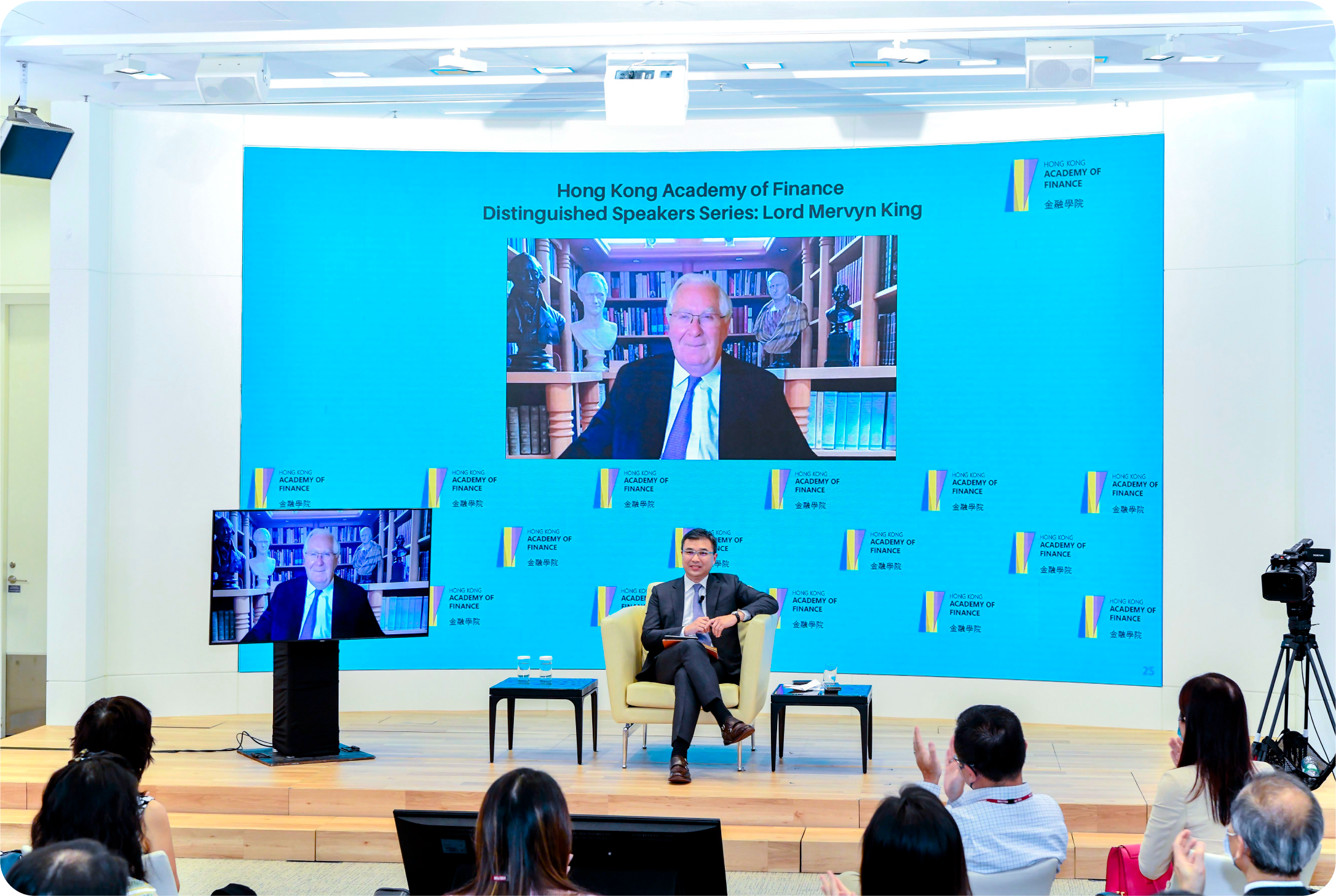
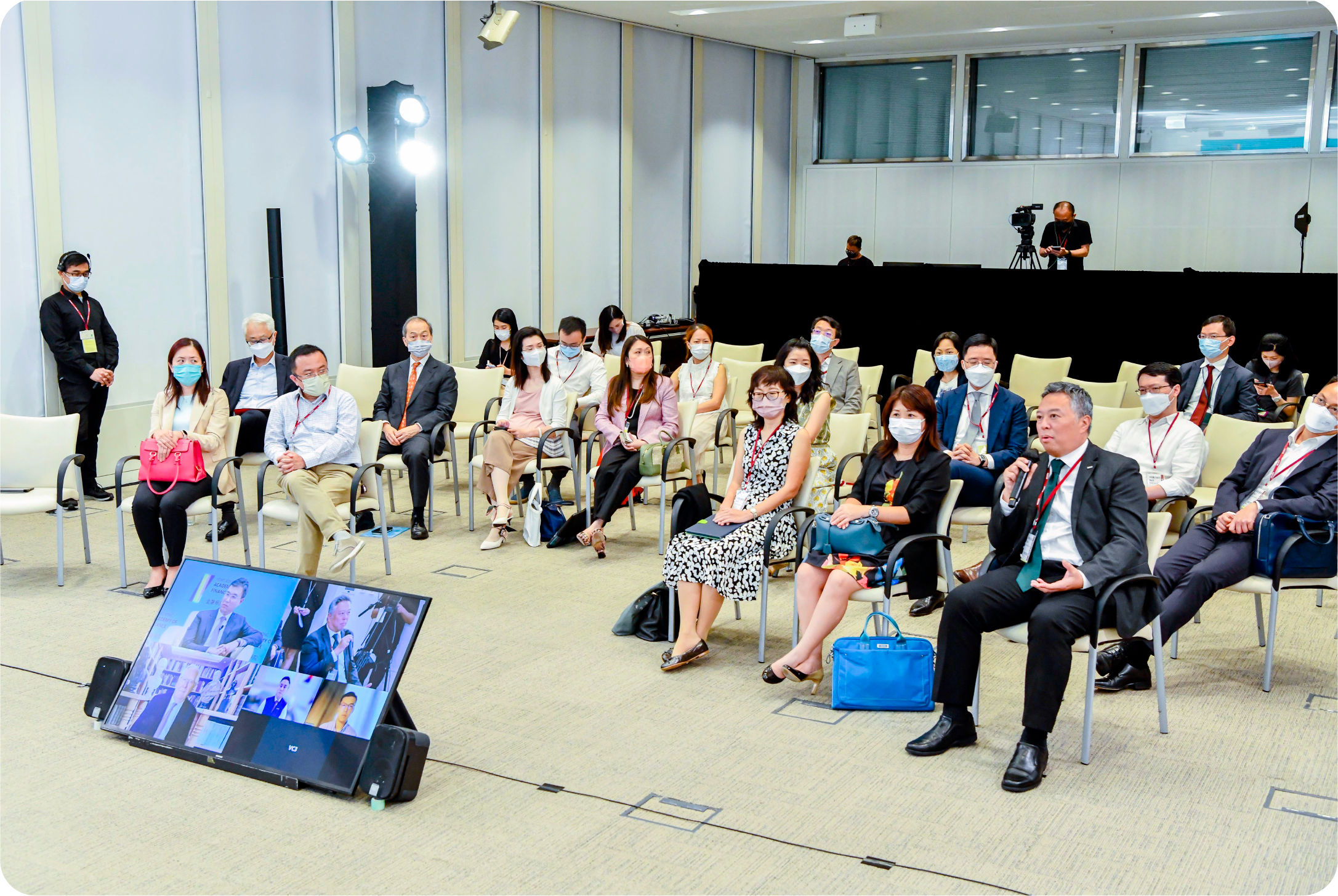
Dialogue with Insurance Authority
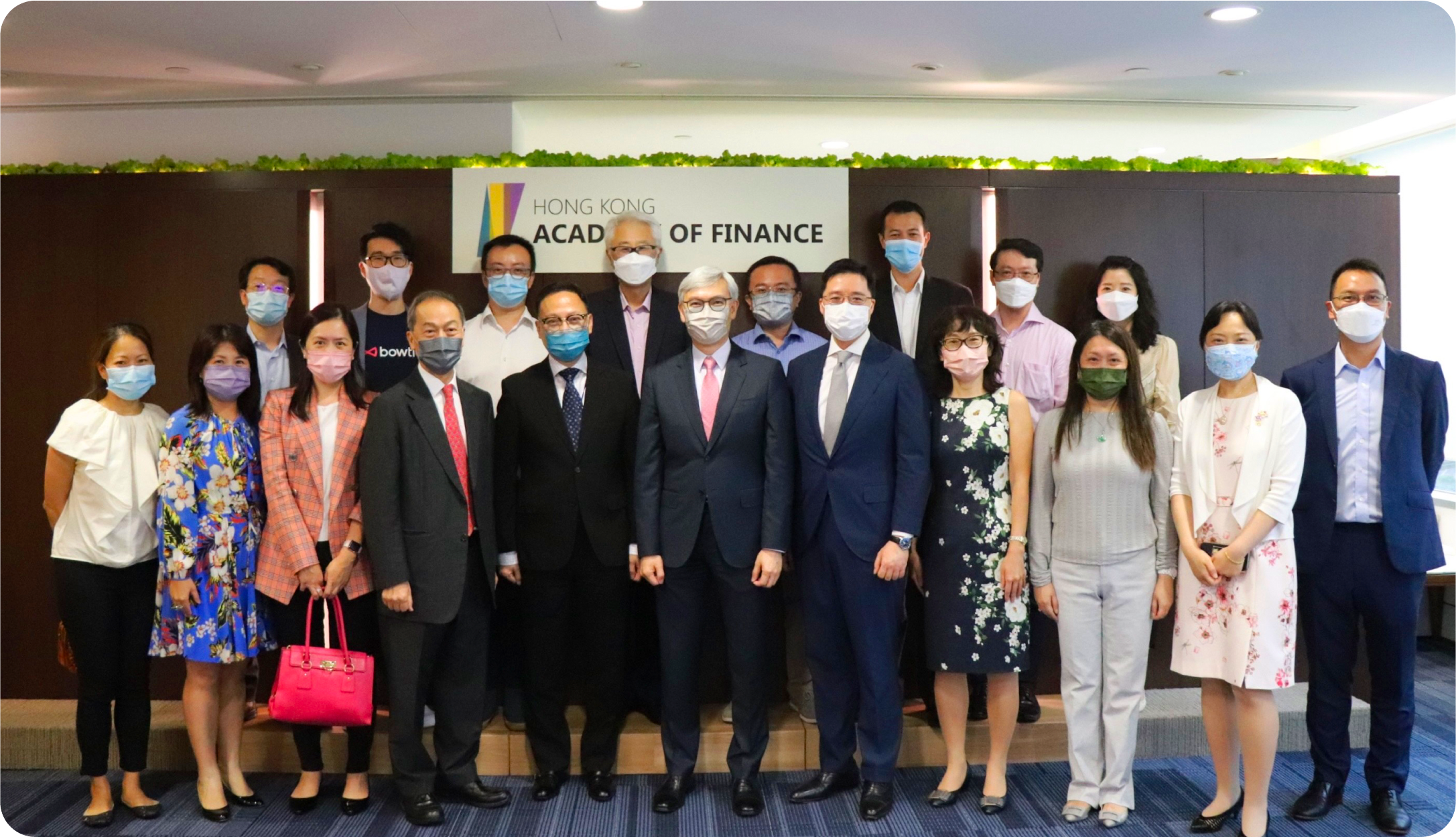
Dialogue with Mandatory Provident Fund Schemes Authority

Dialogue with Mrs Laura Cha, Chairman of HKEX


Distinguished Speakers Series
Lord Mervyn King, former Governor of the Bank of England
The AoF held a conversation session with Lord Mervyn King, former Governor of the Bank
of England on 26 July 2022. The session was moderated by Mr Norman Chan, Senior Adviser
of the AoF.
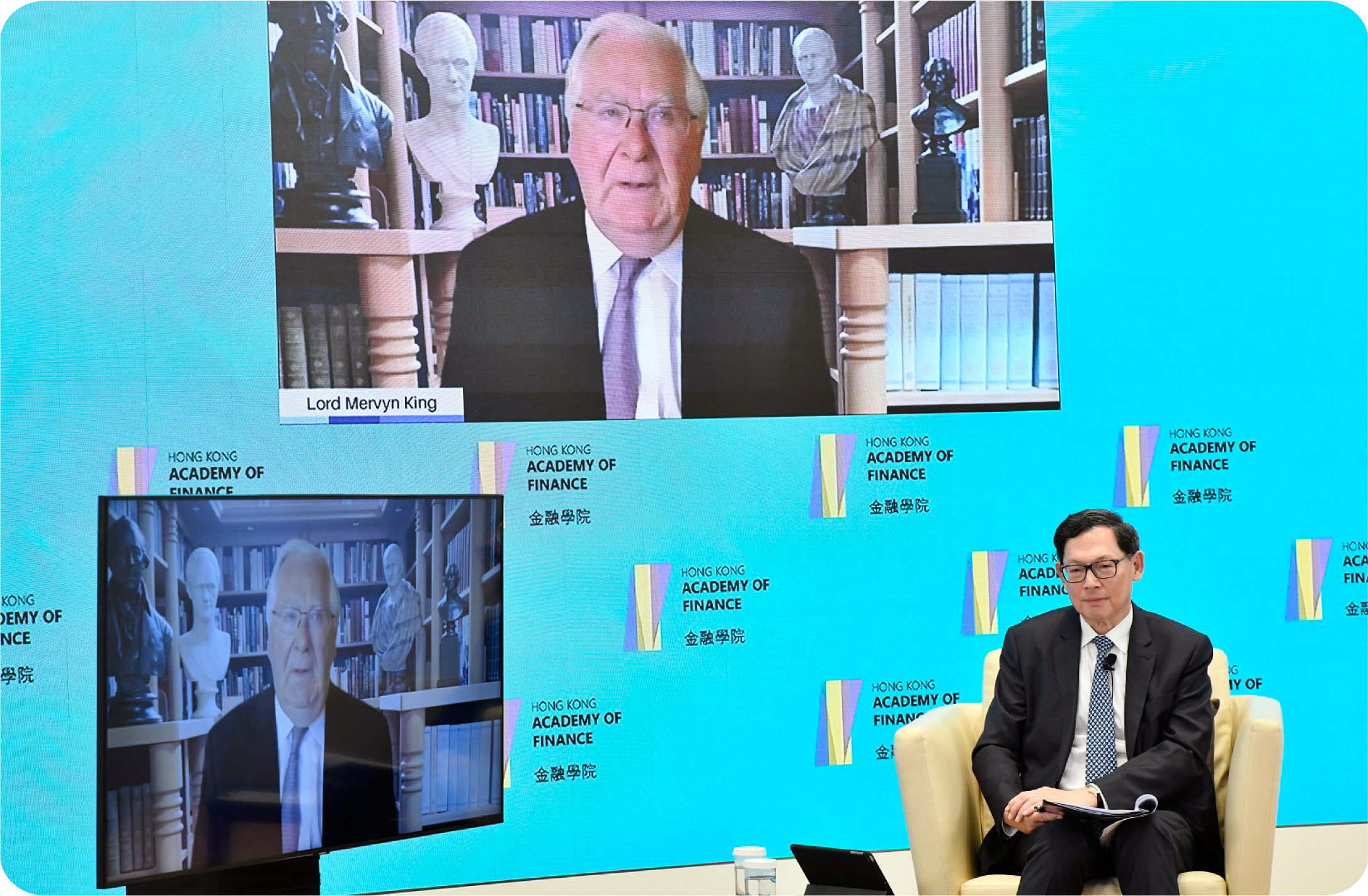
During the event, Lord King shared his views on what governments and central banks in
advanced economies ought to do, amid the complexities posed by geopolitical tensions;
the pandemic; inflation, a tight labour market, and global imbalances. He also explained
what caused the inflation that advanced economies are experiencing, why central banks
must take drastic actions now, what has gone wrong with monetary policy, QE, and central
bank policy making, as well as whether central banks can engineer a soft landing now.
The conversation was conducted in hybrid format, and was broadcast online.

(Top) Mr Lawrence LAM, CEO Designate of Prudential Hong Kong Limited, (Bottom left) Dr
Li CUI, Chief Economist of CCB International Securities Limited and (Bottom Right) Dr
Guorong JIANG, Managing Director of Citigroup Global Markets Asia Limited raised issues
for discussion during the Q&As session.
Key Takeaways from Distinguished Speakers Series -
Lord Mervyn King, former Governor of the Bank of England
On inflation
Lord King was of the view that many central banks printed too much money in
2020-2021 when reacting to the negative economic shocks caused by the COVID-19
pandemic. Since the shocks hit both the demand and supply sides, the output gap did
not change much. Excessive quantitative easing stimulated demand but could not
address supply-side disruptions, which sowed the seed of rising inflation that we
see today, and unfortunately, the emergence of the war in Ukraine exacerbated the
problem.
On interest rate and debt
Lord King thought that current interest rate hikes by major central banks were
necessary to bring down the rising inflation, even if it might cause a recession.
The world economy was very likely to enter a period of stagflation. Debt
restructuring, both sovereign and corporate debts, would be more severe than what we
have seen in the past decade. Policymakers should be on high alert as the world had
not experienced debt restructuring of such a massive scale and all at the same time.
China would likely suffer a huge loss as it had the largest exposure of developing
economies’ debt. Lord King pointed out that the inflation problem could be lessened
if diplomatic solutions for the war in Ukraine work out and that would help bring
down food and energy prices.
Lord King introduced the “Maradona theory of interest rates” which drew an
interesting analogy between the central banks’ interest rate setting and a tactic
deployed by the great footballer Maradona in managing expectations.
On Hong Kong
Lord King saw no reason to change the Linked Exchange Rate System which has worked
well for many years.
Learning to live with COVID (the virus will keep mutating) and opening up
international travel are currently the main challenges for Hong Kong.
On uncertainty
Lord King pointed out that a common pitfall among central bankers was to rely too
much on economic models in which everything was quantifiable. In reality, no one
could have predicted the pandemic or the Ukraine war. Overreliance on quantitative
models for forecast and decision-making gives users a false sense of confidence. He
also believed that forward guidance on interest rates by central bankers is not
appropriate given uncertainties about the future.
His advice was to embrace the fact that there are bound to be “unknown unknowns”.
When faced with uncertainty, it is better to come up with ways to mitigate the
impact and to build resilience in the system, rather than to pretend to have
everything under control. He thought uncertainty could be a good thing in life and
in central banking. Uncertainty can generate creativity, innovation and resilience.

Collaborative Events
HKIMR-ADB-BIS Workshop on "Monetary Policy Spillovers"
The HKIMR co-organised a virtual workshop with the Asian Development Bank (ADB) and the
Bank for International Settlements (BIS) on “Monetary Policy Spillovers” on 25 August.
Mr Edmond Lau, Deputy Chief Executive of the HKMA and Dr Albert Park, Chief Economist
and Director General of Economic Research and Regional Cooperation Development of the
ADB gave welcome remarks and opening remarks respectively, followed by paper
presentations and a Policy Panel on “Monetary policy spillovers from major advanced
economies to emerging Asia and policy implication”.
More than 200 participants from global central banks, International Financial
Institutions and academia attended the workshop online. It was widely reported by local
media.
The workshop programme, welcome remarks and opening remarks can be found
here.
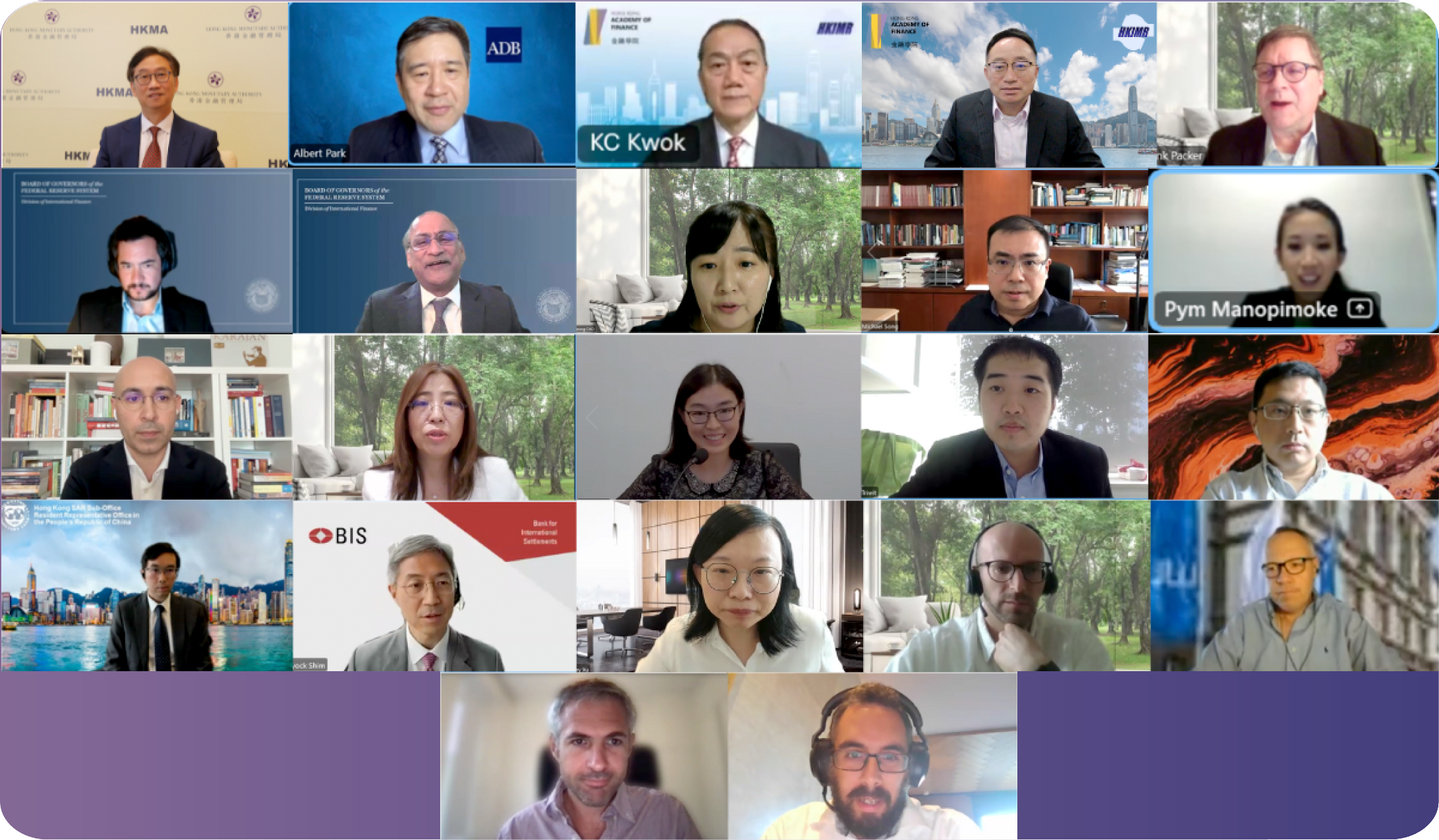

Collaborative Events
AoF-CSC Joint Seminar – “Towards Net Zero: Coalition for a Resilient Future”
On 11 July 2022, the AoF and the Civil Service College (CSC) co-organised a seminar
titled “Towards Net Zero: Coalition for a Resilient Future”. The seminar was attended by
around 90 civil servants at the directorate and senior ranks. The seminar started off
with a sharing by Mr KC Kwok, CEO of the AoF, on Hong Kong’s transition to net zero
emission, followed by an expert panel discussion moderated by Mr Pat Woo, Partner and
Head of ESG-HK, KPMG China. Speakers included Ms Quince Chong, Chief Corporate
Development Officer of CLP Power HK Limited; Dr Raymond Yau, General Manager (Technical
Services and Sustainable Development) of Swire Properties Limited; Dr Kenneth Leung,
Assistant Director (Air Policy) of the Environmental Protection Department of HKSARG;
and Ms Chaoni Huang, Vice President and Secretary General of Hong Kong Green Finance
Association and Managing Director and Head of Sustainable Capital Markets, Global
Markets Asia Pacific of BNP Paribas Banking.
Speakers shared their views on how Hong Kong can achieve carbon neutrality through
net-zero carbon emission for electricity generation, sustainable buildings and green
transport, and explored the opportunities for Hong Kong as an international green
finance hub.

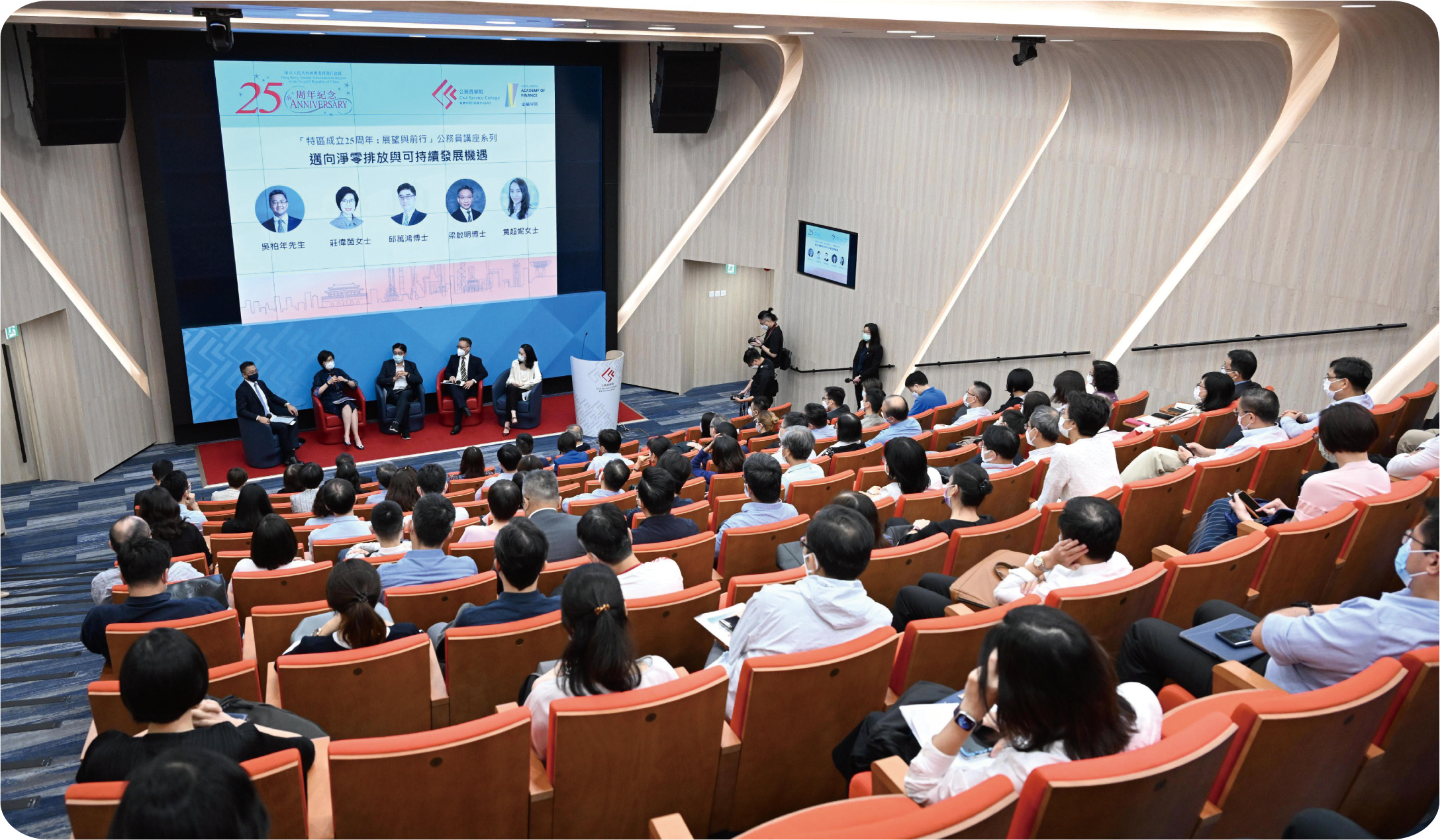

HKIMR Research
Insights from Monetary Research
The HKIMR regularly publishes working papers on monetary and financial economics topics
that are of strategic and policy importance to Hong Kong and the region. With this
digest we introduce a new initiative to share, in a non-academic, clear and concise way,
the main findings of some selected working papers which have been recently published in
the HKIMR working paper series. This digest focuses on the themes of global capital
flows and institutional changes in security markets:

Understanding the effects of capital flows
Capital flows refer to the international movement of money for trade and investment.
Large capital flows in and out of an economy can have implications for monetary and
financial stability. Three recently published HKIMR working papers consider different
aspects of capital flows and their relationships with global financial stability and
climate transition.
Under the current international monetary system, emerging market economies need US
dollars to sustain international trade and repay foreign debt. Yuewen Tang and Alfred
Wong (HKIMR
working paper no. 06/2022) find that in times of adversity, emerging market
economies have to pay a higher premium to borrow US dollars than advanced economies.
Since emerging market economies are also more susceptible to adverse financial
conditions, it is important to monitor and meet their US dollar funding needs.
One way for emerging market economies to protect against a sharp reversal of capital
flows and the potential financial instability is to accumulate foreign exchange
reserves. Moreover, a higher level of reserves makes the economy more attractive to
foreign investors, thereby inducing inflow of foreign direct investment and better
economic performance. Refet S. Gürkaynak, Sang Seok Lee, Paul Luk and Ju Hyun Pyun (HKIMR
working paper no. 13/2022) find that both of these reasons matter, as they are
found to account for the variations in levels of reserves across emerging market
economies.
In addition to financial turbulence, global capital flows can also transmit climate
transition risks, the business risks resulting from shifts toward a low-carbon economy.
Gabriel Wu and Wilson Wan
(HKIMR working paper no. 07/2022) show that the performance of two equity
markets are more likely to move in the same direction if both economies have high
climate transition risks. Moreover, the effects are more prominent after the
announcement of the Paris Agreement, which has raised the global awareness of climate
transition risks. Investors should consider these effects originating from cross-border
climate transition risks in their international investment decisions. This necessitates
further improvements in climate risk disclosures by corporates and financial
institutions.

Assessing institutional changes in international security markets
Global security markets have undergone various institutional changes since the financial
crisis of 2008. A set of HKIMR working papers evaluate these changes in the markets for
equities, mutual funds and bonds, respectively.
In 2016, the Hong Kong Stock Exchange launched Volatility Control Mechanism (VCM), which
triggers a cooling-off period if a price of an equity fluctuates abruptly. During the
cooling-off period, equity trading is only allowed within a fixed price band. In the HKIMR
working paper no. 03/2022, Kalok Chan, F.Y. Eric Lam, Giorgio Valente and Siyuan
Wu provide a first preliminary assessment of the VCM in Hong Kong. They find that the
cooling-off period can curb further equity price swings and increase trading activity
and conclude that the VCM design in Hong Kong was able to deliver the intended results.
Unlike equities traded in exchanges, mutual funds can set their own pricing rule. When
an investor sells a fund, the fund manager has to generate cash for payment by selling
its portfolio holdings. Swing pricing is a new and popular pricing rule which passes the
associated trading costs to the selling investor by lowering the fund price. Gabriel Wu,
Joe Wong and Tom Fong (HKIMR
workingpaper no. 04/2022) find that swing pricing could help funds to avoid
selling off their portfolio holdings in times of financial market stress when trading
costs are exacerbated, such as at the beginning of the COVID-19 pandemic. However, swing
pricing may also come with side effects such as encouraging funds to borrow during
normal times. A proper design is warranted for swing pricing to work more effectively.
Similar to funds, most bonds are traded outside exchanges. The ease at which these bonds
can be traded is determined by bond dealers, who facilitate trading by borrowing money
to buy and sell bonds for their own accounts. Excessive borrowing by dealers has been
blamed for causing market instability. Max Bruche and John C.F. Kuong (HKIMR
working paper no. 08/2022) show, among others, that arrangements put in place in
the US and Europe, which restrict dealers from borrowing, can reduce turbulence in bond
markets. However, the borrowing restrictions on dealers also make it costlier for
investors to trade bonds. The authors conclude that future policies will need to strike
the right balance between market stability and liquidity.
An executive summary and full text are available for every HKIMR working paper mentioned
above.
All working papers and executive summaries published in the HKIMR working paper series
can be
viewed and downloaded here
or using the QR code below.

HKIMR Webinar
The HKIMR has also hosted several Research Webinars as follows:

“Volatility Control Mechanisms: The International
Experience and the Evidence from Hong Kong” on 29 June 2022 by Prof Kalok Chan, The Chinese University of Hong Kong

“The Impact of Peer Performance on Investors' Risk
Taking” on 28 July 2022 by Prof Matthias
Pelster, Paderborn University

“Currency Substitution in a World of Looming Retail CBDCs:
Some Evidence” on 10 August 2022 by Prof Pierre
Siklos, Wilfrid Laurier University

“Do the Markets Value the Green Revenues?” on 2
September 2022 by Prof Weiqiang Tan, Education
University of Hong Kong

"Absolute Blockchain Strength? Evidence from the ABS Market
in China" on 30 September 2022 by Prof Yanfeng
Zheng, The Hong Kong University of Science and Technology

Upcoming Events
14
Oct
Distinguished Speakers Series
Speaker : Neil ShenFounding and Managing Partner of Sequoia China

Moderator : Norman T.L. Chan
Senior Adviser of AoF, former Chief Executive of Hong Kong Monetary Authority
Senior Adviser of AoF, former Chief Executive of Hong Kong Monetary Authority
2
Nov
Nov
HKIMR-AoF Expert Speakers Series
Speaker : John GreenwoodChief Economist of International Monetary Monitor Ltd
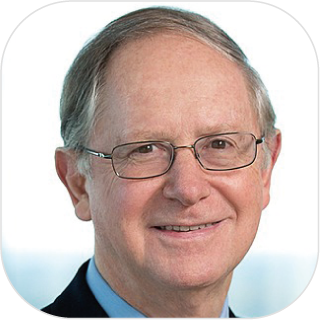
23
Nov
HKIMR 12th Annual International Conference
on the Chinese Economy
The Next Phase of China’s Economic Development
14
Dec





